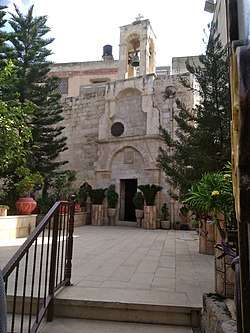Burqin Church
Burqin Church (Arabic: كنيسة برقين) or Church of St George (Arabic: كنيسة القديس جاورجيوس) is a Greek Orthodox church established during the Byzantine period and located in the Palestinian West Bank town of Burqin. It is considered to be the fifth holiest Christian holy place and the third-oldest church in the world.[1][2] The church has been restored several times and is currently in use by the village's small Christian (Greek Orthodox) community.[3]
| Church of St George | |
|---|---|
 | |
| Religion | |
| Affiliation | Greek Orthodox Church of Jerusalem |
| Province | Jenin Governorate |
| Location | |
| Location | Burqin, West Bank |
| Geographic coordinates | 32.457222°N 35.26°E |
| Architecture | |
| Completed | 12th century |
Biblical connection
According to Christian tradition, Burqin is the place in "the region between Samaria and Galilee" where the miracle from Luke 17:11-19 took place: Jesus was passing through on his way from Galilee to Jerusalem when he heard cries for help from ten lepers who were living isolated nearby. He encountered them and told them to present themselves to the priests, although they were not yet cured. On their way their leprosy disappeared. One of them, a Samaritan, returned to Jesus to give thanks. Jesus blamed the nine who did not recognise that their healing was God's gift, faith being the real salvation. Since this miracle, the church became a station for many Christian pilgrims.[4]
History and archaeology
Excavations show that the church passed through four different historical periods.[5]
The administration of the site have said they discovered old remains when they renovated the church, such as oil lamps, Bibles and stamps, in addition to three large Roman-period wells.[6]
Roman period
The cave where the miracle allegedly took place appears to be a Roman cistern[5] and has an opening at the top.[5] Today it contains an altar and has a stone wall at the entrance.[5]
Byzantine and Early Muslim periods
The first church was built over the cave during the Byzantine period.[5] Tradition has it that it was built by Saint Helena in the 4th century.[6] During the 6th–9th centuries the church was extended with an additional building.[5] Afterwards the church was abandoned for unapparent reasons.[5]
Crusader period
The church was renovated during the Crusader period in the 12th century and enclosed by a stone wall.[5] After the 13th century the church was rebuilt and rededicated as a school.[5]
Ottoman to current times
Today, it is composed of the lepers' cave and an 18th-century hall and nave.[3][7]
See also
- Saint George: Devotions, traditions and prayers
References
- Jenin Global Security.
- "Jenin". JMCC.org. Jerusalem Media & Communication Centre. May 19, 2009. Archived from the original on November 11, 2011. Retrieved 10 August 2013.
- "camps". Burqin Church (St. John's). Archived from the original on November 12, 2007.
- "JMCC / Palestinian Culture". jmcc.org. Jerusalem Media & Communication Centre. Archaeological Sites: Burqin Church - Jenin. Archived from the original on October 11, 2008.
- Burqin Church Archived 2012-02-13 at the Wayback Machine This Week in Palestine.
- "West Bank hopes to make ancient church popular tourist destination". Jerusalem Post. 1 April 2015.
- Jenin, Holy Land: Burqin Atlas Tours.
External links
- Where Jesus healed lepers: The Church of St. George, Jerusalem Post